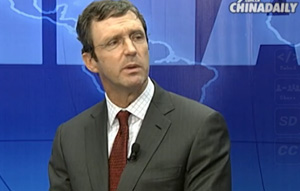Medics soon at work as Peace Ark sails in
Updated: 2013-11-26 09:56
By Peng Yining in Tacloban, the Philippines (China Daily)
|
|||||||||||
Risk of epidemics
According to the World Health Organization, after a flood in the Philippines in 2009, there were more than 1,600 cases of leptospirosis, a bacterial disease spread via the urine of rats. The outbreak claimed 104 lives. In 2012, more than 300 people were infected with the same disease when a tropical storm caused flooding. Eight people died in that outbreak.
"The Philippines is an island nation. The humid weather provides bacteria and pests with a good environment for survival," said Nie Weimin, an expert in epidemic diseases, who also helped in the Haiti relief efforts. "It's very likely that the disaster areas in the Philippines are at risk of an epidemic."
Nie said a Chinese medical team was the first to help the WHO monitor the incidence of infectious diseases in Haiti. It also taught the locals to monitor themselves so they could retain control when the foreign aid workers departed.
"We are planning to do it again in the Philippines. We will work closely with international organizations, including the WHO, local people and other foreign aid workers," he said. "All our medicines and materials conform to international standards."
However, not all medical conditions prompted by natural disaster are physical, so the Peace Ark's medical team also includes experts in mental health.
Guo Yong, a psychologist at the General Hospital of the Chinese Navy, led a team of more than 80 to help people whose lives were wrecked by the Sichuan earthquake. "It's been five years, but the mental health services are continuing," he said. "It's never too late to provide mental comfort."
Guo said survivors of natural disasters often experience acute mental anguish as they attempt to deal with the loss of their loved ones and their own near-death experiences.
"After more than 20 years working in disaster areas, I understand what the people in the Philippines are going through. Their culture and history may be different to ours, but human nature is the same everywhere," he said. "We will help them as much as we would help people back in China."
This is the Chinese navy's first disaster-relief mission overseas, said Wu Shengli, commander of the PLA navy, who described the mission as a goodwill gesture and a chance for China to fulfill its responsibility as the world's second-largest economy.
In its previous missions, the ship has visited 16 countries and provided free medical services to more than 55,000 people.
The Peace Ark is always ready to provide help overseas, said Rear Admiral Shen Hao, the ship's commander.
When he was summoned for the mission on Nov 18, Shen was unsure of the role the ship would play and did not even know the ultimate destination in the Philippines.
"The only thing we were sure about was that the people caught up in the typhoon would need help, so we prepared to sail as quickly as possible to help those in need."
Contact the writer at pengyining@chinadaily.com.cn
Zhang Lei contributed to the story
Related Stories
China's Peace Ark departs for Philippines 2013-11-21 17:27
Chinese hospital ship Peace Ark leaves Myanmar 2013-09-03 16:36
Hospital ship Peace Ark stops in Maldives 2013-07-09 16:25
Today's Top News
Caroline Kennedy visits Japan's disaster-struck regions
China to loosen airspace control
China inks regulation to ban official extravagance
9 in police custody after pipeline blasts
Experts doubt smog linked to low birthrate
China, Romania seal railway deals
Cameron visit a chance to boost ties
Investment rules eased under reform
Hot Topics
Lunar probe , China growth forecasts, Emission rules get tougher, China seen through 'colored lens', International board,
Editor's Picks

|

|

|

|

|

|





